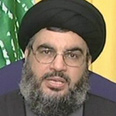
Preliminary implications: As the war reaches an end, more and more worrisome voices are heard from Arab nations, asking loudly and boldly if the 'triumph' against Israel in Lebanon will advance 'the day in which Israel will disappear'.
Ahmed Barakat, a member of Hizbullah's central council, said in an interview to Qatari newspaper al-Watan that "Today Arab and Muslim society is reasonably certain that the defeat of Israel is possible and that countdown to the disappearance of the Zionist entity in the region has begun."
According to Barakat, "This is the reason that Shimon Peres said it was a life or death battle and this is why the triumph of the resistance is the beginning of the death of the Israeli enemy. For, if a mere organization succeeded in defeating Israel, why would Arab nations not succeed in doing so if they allied? Many Arabs and Muslims viewed Israel in a fictional way and the resistance has succeeded in changing this."
When asked how the resistance (aka Nasrallah) succeeded in achieving this victory, he answered: "Our fighters emerged from the Islamic traditions they read about. Moshe Dayan said 'I know that Arabs don't read' but they read very well."
"As Nasrallah likes to say: Regarding the Israeli issue, forgive me, but I don't think anyone knows about it more than us...and therefore, in terms of a deep understanding of Israeli culture, society, economy, psychology, military and media, the resistance has vast experience. This is in addition to the Islamic tradition that our fighters rely on, and which they strive towards: a general ambition – a triumph for the Ummah (Islamic nation), and a personal ambition - to be shahids," he elaborated.
Barakat further stated that none of the Hizbullah leadership was hurt and that the organization retains plenty of rockets and other 'surprises' for use the day after victory. He declared that the inventory would allow the organization to operate from afar and doesn't require proximity to the Israeli border.















